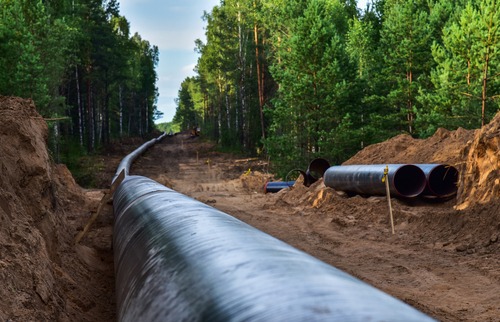
A natural gas pipeline can be built from Pennsylvania to New Jersey, allowing the federal government to invoke eminent domain to take state property, thanks to a 5-4 ruling by the U.S. Supreme Court on Tuesday.
Chief Justice John Roberts wrote the majority opinion in the case involving the State of New Jersey and the PennEast Pipeline Co. In 2018, the Federal Energy Regulatory Commission approved the 116-mile project from Luzerne County, Pennsylvania, across the Delaware River, to Mercer County, New Jersey. The federal government would be allowed to use eminent domain under the Federal Gas Act to take property, if necessary. PennEast secured most of the land but ended up in court with the State of New Jersey over pieces of land where it had claimed interest. New Jersey argued a private company such as PennEast (which is based in Delaware) could not take a sovereign state to court.
The justices – both liberal and conservative – disagreed with New Jersey.
“We are pleased that the Supreme Court kept intact more than seven decades of legal precedent for the families and businesses who benefit from more affordable, reliable energy,” said Anthony Cox, chair of the PennEast Board of Managers. “This decision is about more than just the PennEast project, it protects consumers who rely on infrastructure projects.”
He said those projects ended up in court because of New Jersey’s “political purposes,” but added the energy crises in recent years in California, Texas and New England have proved natural gas can help solve those issues.
“(They) have clearly demonstrated why interstate natural gas infrastructure is so vital for our way of life, public safety and enabling clean energy goals,” he said.
David N. Taylor, president and CEO of the Pennsylvania Manufacturers’ Association said the Supreme Court decision was welcomed after the “awful Third Circuit decision.”
“American energy production makes possible our very high and ever-rising quality of life,” Taylor said. “We look forward to maximizing Pennsylvania’s energy opportunity, bringing to market untold trillions of cubic feet of natural gas to fuel American homes, generate affordable electric, power America’s industrial economy and re-shore petrochemical manufacturing jobs.”
David Holt, president of the Consumer Energy Alliance, noted the case is a vindication of a pipeline project that exceeded stringent environmental regulations.
“We hope this decision will create more opportunities for environmentally responsible infrastructure projects like PennEast to move forward, putting our skilled union tradespeople to work, and reducing costs for communities who face high energy bills,” Holt said.
The pipeline is expected to cost $1 billion. PennEast Pipeline Co. is a group of several energy companies that joined forces to build the pipeline.
In a statement on Twitter, New Jersey State Attorney General Gurbir Grewal said the fight was “far from over” adding that while he was disappointed by the decision from the Supreme Court, he would urge the federal government to “take another look at this harmful project.”
Environmentalists have long opposed the project, but it does have support from the Biden Administration.